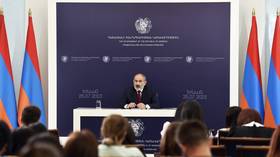Azerbaijan has no territorial claims against Armenia – Baku
The same approach is needed from Yerevan to end the Nagorno-Karabakh conflict, President Ilham Aliyev says
Azerbaijan has no territorial claims against Armenia and expects the same approach from Yerevan, the country’s president, Ilham Aliyev, said in an interview with Euronews that was aired on Tuesday.
Aliyev was commenting on the decades-long dispute over the breakaway republic of Nagorno-Karabakh.
The Azerbaijani leader pointed out that those Armenians living in the region “should choose whether to live as citizens of Azerbaijan as an ethnic minority, as any other ethnic minority, of which Azerbaijan is rich or to leave.” He added that, counter to Yerevan’s allegations of ethnic cleansing, his country is providing ethnic Armenians with a chance to choose. Both states have long made such accusations against each other.
Yerevan has accused Baku of deliberately worsening the humanitarian situation in the region by disrupting the provision of essential goods, gas, and electricity. This past June, Armenian Prime Minister Nikol Pashinyan said that Azerbaijan had even closed access to the disputed region due to which “supplies to Nagorno-Karabakh, even of necessities, have been stopped.”
Referring to the possibility of a peaceful solution of the conflict, in his latest remarks Aliyev expressed hope for a successful conclusion to the peace talks with Armenia in the coming months and urged Yerevan to document Pashinyan’s earlier statements that recognized Nagorno-Karabakh as part of Azerbaijan.
Last year, Yerevan and Baku – with the mediation of Russia, the US and EU – began discussing a future peace treaty with a series of talks held in Washington, Brussels, Moscow, and Chisinau.
The long-running Nagorno-Karabakh dispute dates back to 1988 when the predominantly ethnically Armenian region demanded to be transferred from Soviet Azerbaijan to Soviet Armenia. The tensions erupted into a full-scale war in the early 1990s after the collapse of the Soviet Union. A ceasefire signed in 1994 remained in place for around two decades, but tensions resurfaced in the 2010s. In 2020, fighting began again in what would end up being called the Second Nagorno-Karabakh War.
The renewed hostilities pushed Russia to bring the leaders of the two states to the negotiating table. A ceasefire was agreed and Russian peacekeepers were deployed along the contact line separating the two countries’ territories.
You can share this story on social media:








Comments are closed.